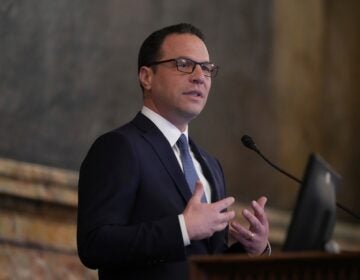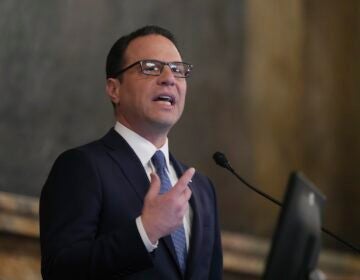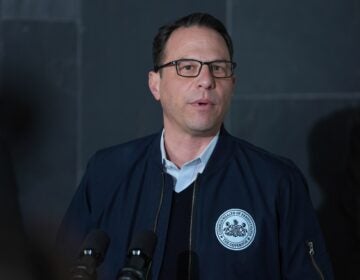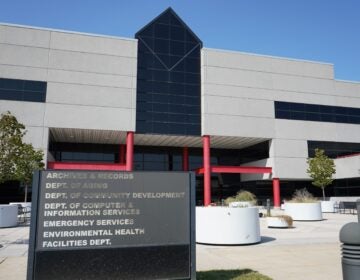‘Cruel and punishing’: Pennsylvania legislator wants to put the kibosh on taxes on Holocaust reparations
Pennsylvania is only one of four states that still taxes Holocaust reparations payments. A news bill seeks to fix that and honor survivors’ legacy.
Listen 1:07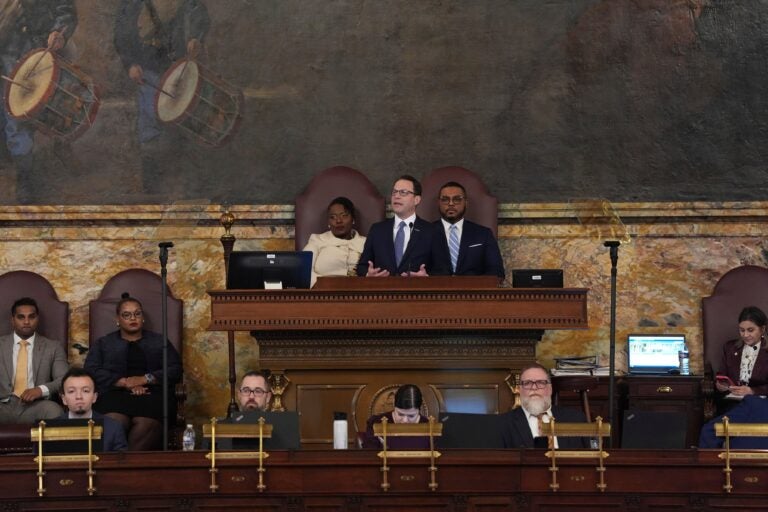
Pennsylvania Gov. Josh Shapiro, accompanied by state House Speaker Joanna McClinton, D-Philadelphia, and Lt. Gov. Austin Davis, delivers his budget address for the 2025-26 fiscal year to a joint session of the state House and Senate at the Capitol is seen, Tuesday, Feb. 4, 2025, in Harrisburg, Pa. (AP Photo/Matt Rourke)
From Philly and the Pa. suburbs to South Jersey and Delaware, what would you like WHYY News to cover? Let us know!
This reporting is funded by HFGF.
Charlotte Gelb waved to her mother as her train left the station. The Jewish teenager was excited about her plans to relocate to New York, blissfully unaware of the tragic reality that was causing the separation.
That final goodbye occurred in Nazi Germany, and her mother would soon be taken to a concentration camp and her father was beaten to death by German police.
Charlotte “had no idea she would never see her mother again and she never forgave herself for not looking back,” her granddaughter, Rachel Howe, told lawmakers at a Pennsylvania House Finance Committee meeting Wednesday.
Howe was testifying in support of a bill to exempt Holocaust-related reparation payments from state income tax. Pennsylvania is one of only four states that still tax such payments made by the German government, as well as court judgments for stolen property, as personal income.
State Rep. Ben Waxman, a Philadelphia Democrat who introduced the bill, told the committee that the total amount of benefit to the state would be “small” but would make a significant difference for survivors.
“This is a way for us to honor survivors, recognize the lasting impact of the Holocaust and ensure that survivors can keep the full measure of their compensation,” Waxman said. “In my mind, it corrects what is an oversight that pretty much every other state in the union has addressed.”
An estimated 6 million Jews were murdered in the Holocaust between 1933 and 1945 before Allied forces liberated Nazi-occupied Europe. Since then, Germany has paid survivors more than $90 billion in total reparations, including $1.4 billion last year.
According to a report released last year by the Conference on Jewish Material Claims Against Germany — commonly known as the Claims Conference — about 250,000 Holocaust survivors remain alive worldwide. Around 38,000 of them live in the United States, including 1,500 in the Philadelphia region.
Most, like Howe’s “Grandma Charlotte,” were children during the war and are now in their late 80s. A growing portion of the reparation funds go toward health care and support, with the president and vice president of the Claims Conference writing that the funds help survivors “live their final years in dignity.”
The federal government stopped taxing Holocaust reparations in 2001 and most other states have followed suit. Pennsylvania remains one of the few outliers.
Howe told the committee that her grandmother lived a frugal life and received about $200 per month from the reparations for the loss of her family.
“She worked hard all her life in America, first in a lampshade factory and later in a bakery,” Howe said. “The reparations gave them the smallest of additional cushions for a movie, a nice coat. Taxing this relatively small amount feels cruel and punitive.”
In 2001, Garb received a $20,000 lump sum for her own pain and suffering. She died in 2012 at 90 years old.
Howe also shared the story of her maternal grandfather, Karlman Strenger, who fought the Nazis with the Russian army and Jewish partisan resistance movement.
“His mother and sister were forced to dig their own graves and shot along with his sister’s young child,” How recalled. “One of his brothers survived the war only to return to their town and, with other Jews, tried to reclaim their house. He was killed in the pogrom that resulted.”
Strenger died in 2021 at 101 years old.
Howe, who has four children ages 5 to 17, has taught Holocaust history with Philadelphia Futures and serves on the board of 3G Philly, an organization for grandchildren of Holocaust survivors, though she was speaking for herself at the hearing. She said she makes sure her kids understand the relative comfort they have and that they “must preserve our religious and cultural legacy, to be proud Jews because their great-grandparents didn’t have that opportunity.”
“We right the wrongs of the past when we proudly wear the Star of David or light Shabbat candles or learn Hebrew and Torah,” she said. “My grandfather may have fought the Nazis with guns but his greatest revenge against Hitler was having nine Jewish great-grandchildren.”
She also tells them that anti-Semitism is just one part of the hate that led to the Holocaust and is the same as the discrimination today.
“The anti-Muslim, anti-Black, anti-groups that we decide that we don’t like and we’re going to blame, it’s all the same hate,” she says. “You have to stand up … when you see that. Because maybe it’s against immigrants right now, but dollars to donuts, it’ll be against you soon. So you better stand up for people when it’s happening.”
The Philadelphia chapter of the Anti-Defamation League of Philadelphia released a statement to WHYY News supporting Wasman’s bill, emphasizing that “80% of US states have laws on the books related to Holocaust education, and the majority of states have laws that exclude Holocaust reparations from personal income tax.
“Pennsylvania is one of few states which tax payments of this kind, and it’s time to lessen the financial burden on Holocaust survivors and their families,” they said.
The Republican chair of the Finance Committee, Rep. Keith Greiner, voiced his support as well.
“I think that just from an ethics view it’s just wrong,” Greiner told the committee. “I think this should have been done a while ago.”

Get daily updates from WHYY News!
WHYY is your source for fact-based, in-depth journalism and information. As a nonprofit organization, we rely on financial support from readers like you. Please give today.



